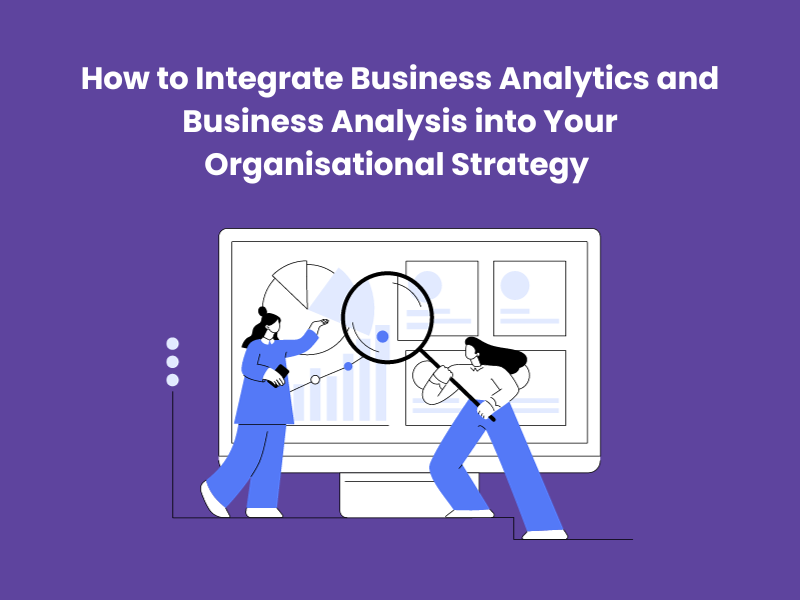In business strategy, the integration of business analytics and business analysis has become imperative. As organizations navigate the complexities of data-driven decision-making, understanding the nuances of these two disciplines becomes crucial. In this blog, we’ll explore the synergy between Business Analytics and Business Analysis, offering insights into their distinct roles and how harnessing both can fortify your organizational strategy. Whether you’re a seasoned professional or a newcomer exploring these realms through Business Analysis Courses, the harmonious integration of these disciplines holds the key to informed and effective decision-making.
Business Analytics vs. Business Analysis: Unveiling the Distinctions
Before diving into integration techniques, it’s critical to understand the difference between Business Analytics and Business Analysis. The analysis of historical data to detect patterns, analyse the impact of actions or events, and assess the effectiveness of a specific tool or scenario is what Business Analytics is all about. On the other hand, business analysis is the practice of recognising business demands, addressing business challenges, and discovering possibilities for firms to attain their objectives. Business Analytics is more concerned with predictive modelling and statistical analysis, while Business Analysis is more concerned with understanding business processes and needs.
Identify Overlapping Objectives
It is critical to discover overlapping goals to effectively combine Business Analytics and Business Analysis. Both fields have the same goal: to help people make better decisions. Company Analytics generates quantitative insights and predictive models, whereas Business Analysis verifies that these insights are consistent with the company strategy. Organisations may create a unified framework that leverages the capabilities of both disciplines by recognising similar goals.
Establish Clear Communication Channels
The key to successful integration is effective communication. Business Analysts and Business Analytics specialists often utilise separate terminology and work within various frameworks. It is critical to establish clear communication channels via cross-disciplinary training or by encouraging a knowledge-sharing atmosphere. This guarantees that Business Analysts integrate insights provided by Business Analytics into actionable plans, resulting in a smooth transition from data-driven insights to strategy execution.
Leverage Predictive Analytics in Business Analysis
Business Analytics’ predictive powers might be a valuable tool for Business Analysis. Business Analysts may forecast future trends, identify prospective issues, and build proactive ways to handle them by utilising predictive analytics models. Integrating predictive analytics into Business Analysis enables organisations to go beyond reactive decision-making and towards a bold and forward-thinking approach to strategy formulation.
Utilise Business Analysis to Refine Analytical Models
While Business Analytics develops sophisticated models, the accuracy and usefulness of these models are dependent on data quality and knowledge of business processes. Business Analysis is critical in the refinement and validation of analytical models. Business analysts may add context, confirm assumptions, and ensure that the data utilised in analytics is aligned with the business’s real-world complexities. This collaborative method improves the accuracy and usefulness of analytical discoveries.
Incorporate Business Analytics in Requirements Gathering
Business Analysis entails acquiring and recording business needs, a process that might benefit from Business Analytics insights. Business Analysts may guarantee that the identified needs correspond with the strategic objectives and are found in the realities exposed by analytics by bringing data-driven insights into the requirements-collecting process. This integration improves the accuracy and relevance of business needs, setting the groundwork for strategic efforts.
Invest in Business Analysis Courses with Analytics Components
Investing in specialised Business Analysis courses emphasising analytics components is a sensible step for professionals wanting to negotiate the confluence of Business Analytics and Business Analysis. These courses provide a thorough grasp of both disciplines, preparing professionals to bridge the gap between data-driven insights and strategic decision-making within an organisational environment.
Conclusion
Organisations may establish a harmonic framework that harnesses the benefits of both Business Analytics and Business Analysis by recognising the unique responsibilities of both disciplines, defining similar goals, and facilitating collaboration. This integrated strategy improves decision-making by ensuring that insights produced from data analytics are smoothly translated into practical plans. Adopting this integration will move your organisation towards better informed and strategic decision-making, whether you’re an experienced expert or just starting with specialised Business Analysis courses.











